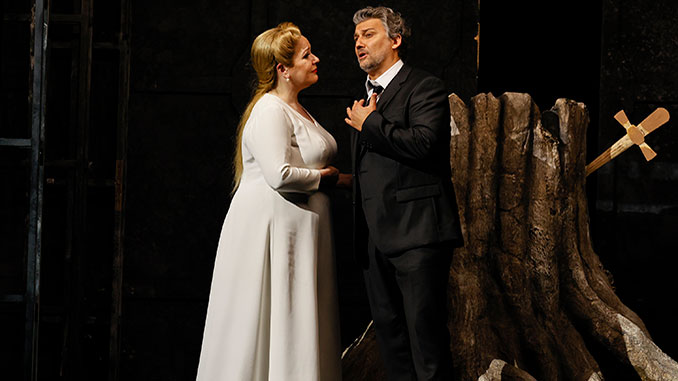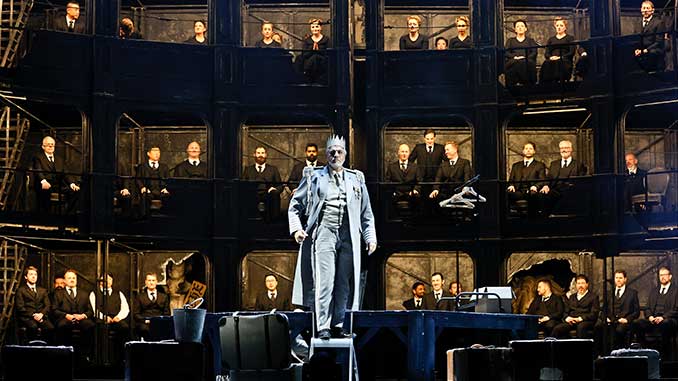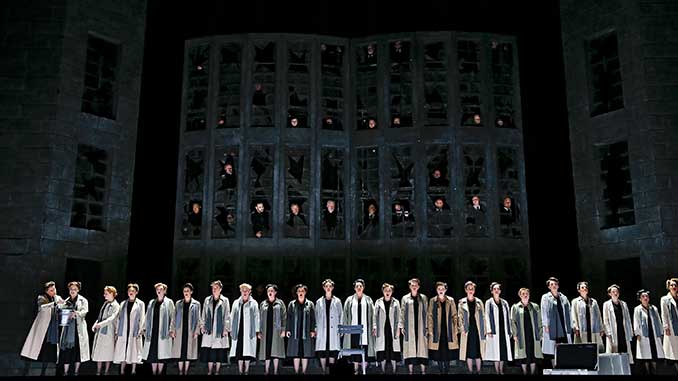 We aren’t Berlin but it couldn’t be said that Melbourne audiences are hard done by when it comes to the amount of quality opera on city stages throughout the year.
We aren’t Berlin but it couldn’t be said that Melbourne audiences are hard done by when it comes to the amount of quality opera on city stages throughout the year.
But when the world’s most acclaimed tenor arrives to interpret one of Richard Wagner’s numerous thought-provoking and complex title characters, it makes for something especially stratospheric.
In a new production of Lohengrin for Opera Australia (a co-production with Théâtre Royal de la Monnaie), German tenor Jonas Kaufmann doesn’t disappoint, bringing sublime human substance and vocal prowess to the Grail knight who answers the prayers of Elsa of Brabant, a noblewoman falsely accused of murdering her brother, Duke Gottfried. At least, in Wagner’s intended 10th century Germanic setting, that is the construct. French director Olivier Py takes another view. More on that later.
Kaufmann builds his performance with impeccable attention to the text, articulating with clear intent and carefully judged emotion. Everything from burnished to velvety, Kaufmann’s seductive timbre bends flawlessly across a broad range, effortlessly releasing shapely high notes and creating remarkable pianissimos as if threading his vocal being through the eye of a needle.
Kaufmann’s final act, In Fernem land, unnahbar euren Schritten, when Lohengrin solemnly proclaims his origins, is a tingling vocal masterpiece wrapped in humility and strength.
Kaufmann is surrounded by an exceptional world-class cast, a credit to Artistic Director Lyndon Terracini’s vision. American soprano Emily Magee is supple-voiced and radiant as Elsa, persuasively shifting from innocence to anxiousness.
On the dark side of humanity, local baritone Simon Meadows impresses immensely in his principal role debut for the company, nailing the spitfire Telramund with hefty vocal ammunition. And French-Russian mezzo soprano Elena Gabouri is a spectacularly formidable Ortrud, Telramund’s cunning wife.
 Supporting roles are filled equally as outstandingly, with large, authoritative bass Daniel Sumegi in a balancing act of diplomacy and command as King Heinrich and stentorian baritone Warwick Fyfe – following up on several magnificent trumpet fanfares from the theatre heights – singing with great earnestness as the Herald. Has an operatic herald ever been assigned such imposing musical power?
Supporting roles are filled equally as outstandingly, with large, authoritative bass Daniel Sumegi in a balancing act of diplomacy and command as King Heinrich and stentorian baritone Warwick Fyfe – following up on several magnificent trumpet fanfares from the theatre heights – singing with great earnestness as the Herald. Has an operatic herald ever been assigned such imposing musical power?
All the way down to the individual Opera Australia Chorus member who forms part of a 70-plus juggernaut showcasing massed choral delicacies, public comment and exaltations, the vast beauty of Wagner’s score resonated.
At the helm, on Saturday’s opening night, conductor Tahu Matheson never compromised on dramatic momentum, orchestral colour and maximum expressive impact. Matheson could take the splendid-playing Orchestra Victoria to high-decibel levels and be confident his singers could sail on the music. It seemed nothing could have surpassed the evening’s musical magnificence.
As the opening ethereal strings settle heartbeats, Py’s far-removed setting in war-ravaged Berlin at the end of World War II is introduced in brooding light and majestic scale. On the stage revolve, set and costume designer Pierre-André Weitz’s versatile 4-level structure is revealed, its broken glass panes and ashen appearance harmonising appropriately with Py’s concept.
Overall, taking on the form of a bombed out theatre in which much action takes place on its stage – and precariously on chairs as if Py wants to emphasise tensions – it sets up the question of what is real and what is imaginary. In this sense it finds a connection to the broadly sourced mythical tale Wagner tells.
Py boldly presents the unsung part of the missing Gottfried as a young boy (Riley Crouch-Phan) in ‘swan white’, having been suffocated by Ortrud using the boy’s feather-filled pillow, and seen at various times that include playing with Lohengrin. It’s an intriguing idea that suggests intentions that Gottfried’s life was to be groomed to carry on Lohengrin’s legacy.
There is no swan to transport Lohengrin through the mist. Instead, a pile of pillow feathers is all that remain as a white overcoat-dressed Kaufmann metaphorically swans in with suave easiness and a duty to fulfil. Kaufmann’s Lohengrin, while exuding the charisma of a saintly leader, certainly has the air of an everyday man. An amusing photo-shoot to record his arrival demonstrates that.
And Elsa’s pressing desire to know Lohengrin’s name and heritage after having been manipulated by Ortrud might even come across as a nightmarish encounter – one amongst large stage props acting as symbols of German Romanticism – in which we see Lohengrin through Elsa’s hallucinatory lens.
Magee, rich and full in voice, gives an utterly searing interpretation to convince as such. Contemplating the scale of trauma triggered by war and considering other theatrical devices used, it is plausible.
 Framing it all, Py seems especially intent on extracting what he can in order to connect Wagner’s anti-Semitic leanings to a future Germany indoctrinated by Nazism. A Nazi-portrayed Ortrud, far from sinking in the finale, is elevated in a most sinister and threatening manner that portends business is not done. For this, Gabouri digs deeply and ferociously in one of many performance highlights.
Framing it all, Py seems especially intent on extracting what he can in order to connect Wagner’s anti-Semitic leanings to a future Germany indoctrinated by Nazism. A Nazi-portrayed Ortrud, far from sinking in the finale, is elevated in a most sinister and threatening manner that portends business is not done. For this, Gabouri digs deeply and ferociously in one of many performance highlights.
On several levels, the words of the American writer and Nobel laureate William Faulkner resonate: “The past is never dead. It’s not even past.”
Wagner’s music is equally celebrated as his beliefs are challenged – a figure unable in death to escape his past and, in many directors’ assessment, to be put on trial. When a white young bare-chested soldier audaciously flexes his gymnastic expertise (an extraordinary sight danced by Reuben James Baron) during the opera’s most recognisable music, the Bridal Chorus, it is as if remnants of Hitler’s promotion of the false idea of glorifying the German people as members of the Aryan race is staining any attempt to celebrate Lohengrin and Elsa’s union.
Despite Py’s imaginative and challenging ideas, set compellingly by revival director Shane Placentino, Wagner’s rich storytelling – of conflict, doubt, vulnerability and attack of faith by reason – wins through. In some uncanny way, that marriage of watertight score and Py’s risk-taking but visually imposing interpretation defines the strength of this production.
With the price of the best seats costing almost as much as a one-way economy airfare to Europe, world-class opera doesn’t come cheap. But I guarantee, when the accompanying adrenaline rush goes home with you, it will feel like that’s where you’ve been.
Lohengrin
State Theatre – Arts Centre Melbourne, 100 St Kilda Road, Melbourne
Performance: Saturday 14 May 2022
Season continues to 24 May 2022
Information and Bookings: www.opera.org.au
Images: Emily Magee as Elsa and Jonas Kaufmann as Lohengrin | Daniel Sumegi as Heinrich and the Opera Australia Chorus | The Opera Australia Chorus – Lohengrin at Arts Centre Melbourne – photos by Jeff Busby
Review: Paul Selar
